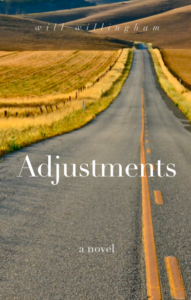Waiting for messages out of the dark you were poor.
The world was always yours: you would not take it.
—Archibald MacLeish
…it seems like Keats lives with some kind of tension.
Between what he is and ought to be, or maybe
between who he is and wants to be.
—Will Phillips
When I was eighteen years old, I left Columbus, Ohio, my family, all the friends I had made in high school, my best friends the Sullivan brothers, a few close girlfriends, and my beautiful, white, supercharged 1964 GTO the Sullivans rebuilt for me. I left my home and moved to Los Angeles to be a film actor. I thought it would be that simple. It wasn’t. I married there, moved to Boulder, CO, with my wife, where I lived in a dream house across from the flatirons of the Rocky Mountains, divorced there, moved back to Ohio to finish college, moved to Virginia to go to graduate school and then lived for twenty years in North Carolina, far in the country. I moved to some of these places, and from others. Even today, many years later, I wonder sometimes which was which, because sometimes it’s hard to tell. Sometimes, we are reticent to admit when we’ve moved to escape. Is that the case with Will or Cameron?
It was not confidence that allowed me to move thousands of miles from my home, not knowing a soul in California. To use a kinder word to myself, it was both desperation and naiveté. Adjustments has made me reflect: can you run to a place and run from a place simultaneously? This is one of the questions posed to Will. In a way, looking back, I was running away from home, because home held nothing for me.
Early in Adjustments, Joe Murphy tries to remember and recite a poem to Will by Archibald MacLeish. “You need some MacLeish in your life,” Joe tells him, but he can’t remember all of the poem. The poem fragment Joe remembers is from “A Speech To a Crowd.” It ends with the admonition: The world was always yours: you would not take it.
What does this mean to “take the world?” Does it apply to Will? We’ve heard of “taking the world by storm.” Can most of us do this? How do you take the world and its boundless sunrises and sunsets, its sweet, bitter and bittersweet memories, its flesh and bone before your eyes that talks and walks into your every sense, nudging you to awake from the denizens of your history?
The pages for this week have much to do with Will’s memories: the many faces of Barbara—girlfriend, Barbie doll head, clerk in the Public Records Office, a spider, and a blue ghost of a cell phone light. And the other remembrances of women and events in Will’s past, dredged up through his present events—Kelly, the Copenhagen dipping camp mate, his sister Molly, her friend Allison and a “makeover” party where Will is humiliated, and the various match-making victims of Pearl’s efforts on Will’s behalf.
I have to say my favorite pages began on that dark night where Will found Cameron walking her Jack Russell terrier. It made me ask myself if there were less ominous “messages out of the dark.”
From the point where Will realized the previously unidentified woman he’d seen jogging in the street in black was Cameron, through their sneaking into Pearl’s house, dancing in the spray of colors spilled from the stained glass window, procuring Pinot Grigio, and reading of the fairy tale “The Wild Swans,” I thought these pages illuminated Will’s colors in quite an enchanting way.
This week we’re discussing chapters 17-34 of Will Willingham’s novel Adjustments, the story of Will Phillips’s awakening and the acceptance of his frail, funny, fumbling, and beautiful selves. It is also the story of those who heartily and sometimes hesitantly helped him take the world he could accept, and the world he could change.
What is it we need as human beings, in spite of our past, even if we are not related, no matter if we are strangers or seem strange? What enables us to reveal ourselves to others and to ourselves. Is it not touch and the many ways we do this?
Read along with us:
November 20: Chapters 1 – 17
December 4: Chapters 17 – 34
December 11: Chapters 34 – 52
Get Inbox Delivery of Book Clubs
Our book club discussions are a patron perk.
$5 patrons can opt to get each book club edition delivered in full straight to their inboxes, with a photo and link to the discussion!
Photo by Noriaka Tanaka, Creative Commons license via Flickr. Post by Richard Maxson.
- Pandemic Journal: War is Over (If You Want It) - January 7, 2021
- Pandemic Journal: An Entry on How We Learn - April 23, 2020
- Adjustments Book Club: Homecomings - December 11, 2019



Will Willingham says
It’s funny because MacLeish kind of found his way into the story by accident. I’d gotten a copy of a collection of his along with the Keats volume, and I started looking at it to see if there was anything to add. And I stumbled on the referenced poem.
The line you quote above, “the world was always yours: you would not take it” is so fitting for Joe’s conversations with Will, illuminating all the ways that things are right there in front of him and he won’t make a move for them. Here’s hoping that Will went home and read the rest of the poem…
L.L. Barkat says
What I find interesting is that Will began taking the world before he knew it, sparked by that meeting with the puzzling and gently powerful old man who invited him in to far more than an insurance claim. The way Will compelled himself to climb the tower on the way home, though it was hard, seemed to presage that new openness to what life was going to hold out to him (and what he would agree to receive) through Joe, through Cameron, even through Pearl whom he’d known for a while.
Sometimes, everything we have is already within us. What we need is someone or something to call to it. Joe called. (Hee. 🙂 Quite literally! 🙂 )
The many faces of Barbara tend to be oddly disembodied, while also being part of something much larger. Again, I note that this gives the sense that Barbara is “the system” more than any single character or object. But maybe “Barbara” is also how the system can make us feel: separated from what is whole and heart-nurturing.
I loved the dancing scene. It did, yes, illuminate Will’s colors. He denied this even as Cameron made the observation. But, nevertheless, the reader agrees with Cameron: Will knew how to dance, instinctively, by tracing what was beautiful beneath his feet.
Richard Maxson says
One of the funniest scenes where Barbara is “the system” is the Public Records Office with its lines and bell, blatantly pitting Will against ‘rules for rules sake.’ It reminded me of the hotel scene in The Graduate where Ben has to ring for the desk clerk. It also reminded me of the ‘chicken-salad sandwich scene in the movie Five Easy Pieces. If you’ve never seen the movie, the scene is available on YouTube.
Will being haunted by Barbara was also evident in the body-less Barbie doll, who turned out to be not what Will envisioned her to be.
It seemed like a reader could spend a considerable search just looking for items, people, and events that were not what they seemed. Another one that stands out for me was part of that benevolent ‘message out of the dark’ the story of Judge Barkley and the punk who insulted his wife. It seemed a lesson for Will that it doesn’t take a he-man to stand up to a bully.